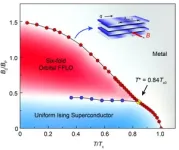(Press-News.org) In a ground-breaking experiment, scientists from the University of Groningen, together with colleagues from the Dutch universities of Nijmegen and Twente and the Harbin Institute of Technology (China), have discovered the existence of a superconductive state that was first predicted in 2017. They present evidence for a special variant of the FFLO superconductive state on 24 May in the journal Nature. This discovery could have significant applications, particularly in the field of superconducting electronics.
The lead author of the paper is Professor Justin Ye, who heads the Device Physics of Complex Materials group at the University of Groningen. Ye and his team have been working on the Ising superconducting state. This is a special state that can resist magnetic fields that generally destroy superconductivity, and that was described by the team in 2015. In 2019, they created a device comprising a double layer of molybdenum disulfide that could couple the Ising superconductivity states residing in the two layers. Interestingly, the device created by Ye and his team makes it possible to switch this protection on or off using an electric field, resulting in a superconducting transistor.
Elusive
The coupled Ising superconductor device sheds light on a long-standing challenge in the field of superconductivity. In 1964, four scientists (Fulde, Ferrell, Larkin, and Ovchinnikov) predicted a special superconducting state that could exist under conditions of low temperature and strong magnetic field, referred to as the FFLO state. In standard superconductivity, electrons travel in opposite directions as Cooper pairs. Since they travel at the same speed, these electrons have a total kinetic momentum of zero. However, in the FFLO state, there is a small speed difference between the electrons in the Cooper pairs, which means that there is a net kinetic momentum.
‘This state is very elusive and there are only a handful of articles claiming its existence in normal superconductors,’ says Ye. ‘However, none of these are conclusive.’ To create the FFLO state in a conventional superconductor, a strong magnetic field is needed. But the role played by the magnetic field needs careful tweaking. Simply put, for two roles to be played by the magnetic field, we need to use the Zeeman effect. This separates electrons in Cooper pairs based on the direction of their spins (a magnetic moment), but not on the orbital effect—the other role that normally destroys superconductivity. ‘It is a delicate negotiation between superconductivity and the external magnetic field,’ explains Ye.
Fingerprint
Ising superconductivity, which Ye and his collaborators introduced and published in the journal Science in 2015, suppresses the Zeeman effect. ‘By filtering out the key ingredient that makes conventional FFLO possible, we provided ample space for the magnetic field to play its other role, namely the orbital effect,’ says Ye.
‘What we have demonstrated in our paper is a clear fingerprint of the orbital effect-driven FFLO state in our Ising superconductor,’ explains Ye. ‘This is an unconventional FFLO state, first described in theory in 2017.’ The FFLO state in conventional superconductors requires extremely low temperatures and a very strong magnetic field, which makes it difficult to create. However, in Ye's Ising superconductor, the state is reached with a weaker magnetic field and at higher temperatures.
Transistors
In fact, Ye first observed signs of an FFLO state in his molybdenum disulfide superconducting device in 2019. ‘At that time, we could not prove this, because the samples were not good enough,’ says Ye. However, his PhD student Puhua Wan has since succeeded in producing samples of the material that fulfilled all the requirements to show that there is indeed a finite momentum in the Cooper pairs. ‘The actual experiments took half a year, but the analysis of the results added another year,’ says Ye. Wan is the first author of the Nature paper.
This new superconducting state needs further investigation. Ye: ‘There is a lot to learn about it. For example, how does the kinetic momentum influence the physical parameters? Studying this state will provide new insights into superconductivity. And this may enable us to control this state in devices such as transistors. That is our next challenge.’
Reference: Puhua Wan, Oleksandr Zheliuk, Noah F.Q. Yuan, Xiaoli Peng, Le Zhang, Minpeng Liang, Uli Zeitler, Steffen Wiedmann, Nigel E. Hussey, Thomas T.M. Palstra & Jianting Ye: Orbital Fulde–Ferrell–Larkin–Ovchinnikov state in an Ising superconductor. Nature, 24 May 2023.
END
Scientists find first evidence for new superconducting state in Ising superconductor
2023-05-24
ELSE PRESS RELEASES FROM THIS DATE:
Where do our limbs come from?
2023-05-24
For Immediate Release
Contact: Mark Couch, 303-724-5377, mark.couch@cuanschutz.edu
Where Do Our Limbs Come From?
AURORA, Colo. (May 24, 2023) – An international collaboration that includes scientists from the University of Colorado School of Medicine has uncovered new clues about the origin of paired appendages – a major evolutionary step that remains unresolved and highly debated.
The researchers describe their study in an article published today in the journal Nature.
“This has become ...
In resistance training, focusing on load or number of repetitions leads to same muscle growth
2023-05-24
Which kind of resistance training promotes more muscle growth: low load with many repetitions or high load with fewer repetitions? According to a study conducted at the State University of Campinas (UNICAMP) in São Paulo state, Brazil, it makes no difference.
The study lasted eight weeks and involved 18 volunteers in two different training protocols. One group performed high-load (HL) exercises with fewer repetitions, while the other did low-load (LL) exercises with more repetitions. Muscle mass was measured in the first and last exercise sessions. A comparison of the two groups did not show any difference in muscle growth or metabolic stress, measured in an ...
Why do some long Covid patients continue to have difficulty exercising?
2023-05-24
While some patients recover from the effects of SARS-CoV-2 infection, others have experienced the aftereffects of COVID-19 long after the initial infection. One of these long COVID symptoms is reduced exercise capacity. But questions remain about the mechanisms underlying why some COVID patients continue to experience diminished exercise capacity while others recover without this condition.
In a study recently published in the Journal of Infectious Diseases, a team of researchers from UC San Francisco found that lower than expected exercise capacity was common ...
AI used to advance drug delivery system for glaucoma and other chronic diseases
2023-05-24
Wilmer Eye Institute, Johns Hopkins Medicine researchers say they have used artificial intelligence models and machine-learning algorithms to successfully predict which components of amino acids that make up therapeutic proteins are most likely to safely deliver therapeutic drugs to animal eye cells.
The project, a collaboration with researchers from the University of Maryland, holds promise for advancing new and more tolerable drug treatments for common chronic blinding eye diseases, including glaucoma and macular degeneration, which affect 3 million and about 20 million people in the United States, respectively. Current drug therapies ...
Epigenetic profiling identifies potential COPD treatment targets
2023-05-24
Impaired function of lung fibroblast is considered causative for symptoms of the incurable lung disease COPD (Chronic Obstructive Pulmonary Disease). Using high-resolution epigenetic profiling, German and British scientists have now identified potential targets for COPD treatment. The team detected early epigenetic changes in the genome of COPD fibroblasts, providing new insights into the disease pathogenesis and potential therapeutic avenues.
COPD, affecting approximately 600 million people globally, is characterized by chronic inflammation, progressive airway narrowing, and alveolar destruction. Despite its global prevalence, ...
CHOP researchers comprehensively assess the safety of using your head in youth soccer
2023-05-24
Philadelphia, May 24, 2023 – Repeatedly heading a soccer ball has been previously associated with negative long-term brain health for professional players. However, in a new study from researchers at the Minds Matter Concussion Program at Children’s Hospital of Philadelphia (CHOP), a small number of repeated soccer headers equivalent to a throw-in did not cause immediate neurophysiological deficits for teens, suggesting that limited soccer heading exposure in youth sports may not result in irreversible harm if players are properly trained.
The ...
Case study reveals potentially lethal side effects of lecanemab for treatment of Alzheimer's disease
2023-05-24
Amsterdam, May 24, 2023 – In a noteworthy case study published in the Journal of Alzheimer’s Disease investigators report autopsy findings in a 65-year-old woman with Alzheimer’s disease (AD) who received three open label infusions of the experimental anti-amyloid beta (Aβ) antibody drug lecanemab. Four days after the last infusion, she experienced stroke symptoms and died several days later due to multifocal intracerebral hemorrhage despite attempts at therapeutic intervention. Neuropathologic findings reflected ...
How can universities better understand students’ experiences of violence and victimisation?
2023-05-24
Researchers from City, University of London, in collaboration with the University of Surrey, De Montfort University, Universities UK (UUK) and the National Centre (NatCen) for Social Research have conducted the first pilot study into students’ experiences of all forms of violence and victimisation at UK universities.
The Violence at University project, led by Dr Carrie-Anne Myers, Reader in the Department of Sociology and Criminology at City, aimed to investigate whether an effective tool could be developed for tracking when, where and how incidents take place.
Tackling violence and harassment has been high on universities’ agenda for several years. Hate crime has ...
Use of AI: Placebo effect increases risk-taking
2023-05-24
Human augmentation technologies refer to technological aids that enhance human abilities. They include things like exoskeletons, but also augmented reality headsets. A study at the Chair of Human-Centered Ubiquitous Media at LMU has now shown that users have high expectations of the effects of these technologies. As soon as they believe that AI is enhancing their cognitive abilities, they increase their risk-taking. And they do this independently of whether the AI is actually assisting them.
“The hype around AI applications affects the expectations of users. This can lead to riskier behavior,” says Steeven Villa, doctoral researcher ...
Mixing metals for improved performance
2023-05-24
NEWPORT NEWS, VA – A teenage fascination with metals has led to a prestigious early-career award for a superconducting radiofrequency (SRF) materials scientist at the U.S. Department of Energy’s Thomas Jefferson National Accelerator Facility.
Shreyas Balachandran has been chosen to receive the ICMC Cryogenic Materials Award for Excellence, presented annually to an individual under 40 who has demonstrated innovation, impact and international recognition for their work in advancing the knowledge of cryogenic materials.
“It’s ...




